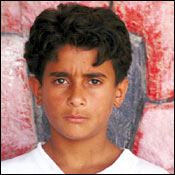
After yet another horrific week of suicide bombings – a bus in Haifa, a mall in Jerusalem – I am resolved not to return to Israel. Whether religion organizes violence, or beauty itself is toxic, or the desert makes you crazy, those Western Walls and fairy-tale mosques and bloody sepulchres, those prophetic stones, hermetic cults, and siege mentalities, those Second Comings, Third Temples, catacombs, and citadels, don’t need tourists like me to help hallucinate.
With my pale skin, male chromosomes, U.S. passport, and gold credit cards, I will hide in the World Trade Center. But the children we meet in Promises, the prize-winning film that concludes this season’s POV series, have nowhere else to go. Moishe, Mahmoud, Shlomo, Sanabel, Faraj, Daniel, and Yarko, ages 10, 11, 12, and 13, are the sons and daughters of rabbis, journalists, and jailbirds, as well as a geography of checkpoints – from the Old City to a fortified West Bank settlement to the Deheishe refugee camp to such states of mind as Gaza and Masada. They were interviewed by B. Z. Goldberg, Justine Shapiro, and Carlos Bolado toward the end of one millennium, with a depressing follow-up at the start of the next. If we were hoping for a rapprochement, we were foolish.
They are, of course, appealing, whether standing in line to visit a father in prison or attending a memorial for a victim of a drive-by shooting or contemplating the rubble of what was once your grandmother’s home. And articulate, kicking around ideas like soccer balls. And media-savvy, too, mugging for the camera. But they are also curious and venturesome, which is why the volleyball twins Daniel and Yarko agree to spend an afternoon with Faraj, the sprinter, and so meet Sanabel. But their heads are full of what their parents tell them, what their teachers teach, what politics and history thrust upon them, and slogans of romance and death. They may not have wanted to be “Children of the Stone,” but they didn’t have a choice. They were conscripted.
Now look at their elders in action, in Digging for the Truth. This is the story, well told and infuriating, of archaeology in the holy land with its own ideological agenda. That agenda is either to verify or to discredit the Bible as history, as if ancient Aramaic scribble on Dead Sea papyrus were a deed in perpetuity, an eyewitness exoneration, or a license to kill. See these scientists dream their identity politics over Stone Age teeth and Bronze Age toenails, smashed pottery, shattered frescoes, catapult stones, and holes in the ground. See them seek David in a tunnel or at Karnak, Solomon at Megiddo, and Joshua in a basket of skulls. See them insult one another as if their respective investments in a warrior or a pastoral past will ever be of any use to Moishe, Mahmoud, Shlomo, Sanabel, Faraj, Daniel, and Yarko. Ask yourself if this carbon-dated agitprop is what Herzl wrote his play about; if this is what revisionists from Odessa, socialists from Bobruisk, interpreters of Maimonides, and world-reforming vegetarian violinists really meant by Zion.
Vineyards and olive groves, vipers and goats, chalk and salt – all this, plus three religions, although Jews & Christians: A Journey of Faith mentions Islam only once, in ghostly passing. These are nevertheless a remarkable couple of hours, in which the talking heads – priests, rabbis, theologians, scholars, half the faculty of the Divinity School at Harvard – have something pointed to say, and ordinary citizens get to say something back. So, besides looking at more travel footage of the Sea of Galilee and the Western Wall, we hear about Father Abraham, circumcised Jesus, the Lord’s Prayer (“kosher to the hilt”), law versus love, baptismal waters, atonement and forgiveness at Yom Kippur and Easter, “supercession,” “triumphalism,” “holy envy,” Vatican councils, and the Holocaust. What is proposed, without chicken soup or sentimentality, is a partnership of faiths. Better too late than bloody never.
In Brief
Methuselah Tree (December 11; 8 to 9 p.m.; Channel 13) looks at the past 5,000 years from the point of view of a many-ringed California bristlecone (given voice by the poet Roger McGough), imagining the pyramids, the seismic shock that sank Minoan civilization, the machine age, and the nuclear era, all to achieve Disneyland.
Jane Doe (December 11; 9 to 11 p.m.; USA) is a surprisingly satisfying thriller in which Rob Lowe, the CIA, computer technologists, dealers in arms and germ warfare, kidnappers, drug lords, and Cuban transvestites don’t stand a chance against a red-haired single-mother (Teri Hatcher).
Wheel of Life (December 12; 9 to 10:30 p.m.; Channel 13) is kung fu instead of Irish step dancing. The Shaolin monks of Hunan, China, team up onstage with composer Barrington Pheloung, choreographer Darshan Singh-Bhuller, and director Micha Bergese to retell their origin myth in leaps and bounds, a sort of Crouching Tiger, Hidden Carradine.
Off Season (December 16; 8 to 9:30 p.m.; Showtime) requires Hume Cronyn to play Santa Claus on a Florida vacation so that Rory Culkin recovers from the accidental death of his parents, his bartending aunt Sherilyn Fenn gets her chance to sing torch songs in a nightclub, and a very confused Adam Arkin can choose between dentistry, law enforcement, and Tennessee Williams.
A Town Without Christmas (December 16; 9 to 11 p.m.; CBS) sends a cynical and lonely TV reporter, Patricia Heaton, to the Northwest sticks to find a child who has threatened to commit suicide on Christmas Eve. She will, instead, find Rick Roberts, a novelist who is trying to track down a painter who may have been the lumberjack who saved his life as a child. Almost everybody else in this heartwarming TV movie is played by Peter Falk.